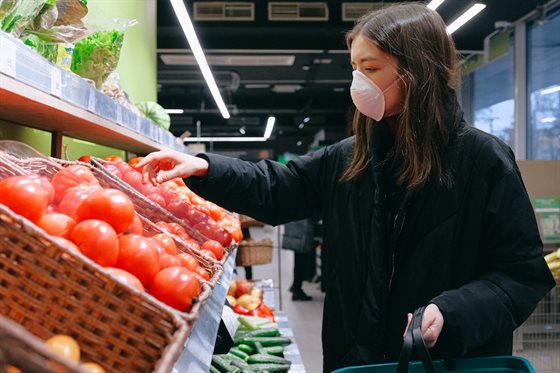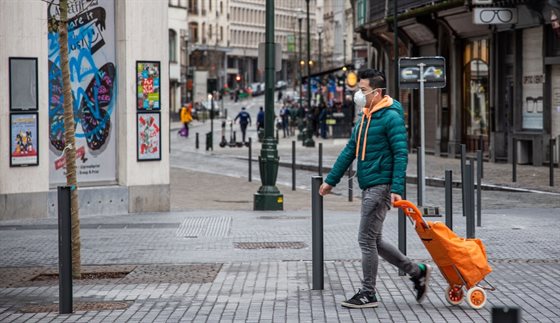The debate over wearing face masks has been one constant throughout the COVID-19 pandemic. This week, the Government has announced that wearing a face covering in shops and supermarkets will be mandatory in England from 24 July.
We asked viriologist Dr Maitreyi Shivkumar of De Montfort University Leicester (DMU)'s School of Pharmacy to give us the facts behind face masks and whether we should be wearing masks. Here's what she said:

How does SARS-CoV-2 spread?
The two major methods of spread are via respiratory droplets or contact transmission (that is, touching your face, nose, or mouth following contact with a contaminated surface – this is why it is so important to wash your hands and avoid touching your face). Virus-containing respiratory droplets expelled by an infected individual coughing or sneezing can transmit the virus to anyone who is in close contact. Not just coughing though, even singing has been implicated in the spread of SARS-CoV-2, evidenced by more than three-quarters of a choir in Washington State, USA showing symptoms or being diagnosed with COVID-19 after a choir practice.
Do face masks protect against transmission by respiratory droplets?
It follows that minimising the expulsion of respiratory droplets from an infected individual would likely reduce the risk of transmission of the virus, which we call “source control”. So, would face masks be effective for this?
Currently, there are not many studies addressing this with SARS-CoV-2; one report comparing surgical masks and cotton masks in four COVID-19 patients concluded that neither of the masks were effective in filtering the virus expelled by coughing.
However, it is still unclear if masks reduce the distance travelled by the virus-containing droplets, and further study is required to assess the effectiveness of masks against COVID-19 spread under different conditions.
We can also try and extrapolate from what we know of other similar viruses. In another recent study, Leung and colleagues showed quite definitively that surgical masks minimised the release of common cold-causing human coronaviruses in droplets and aerosols from infected individuals. Research looking at seasonal flu showed that masks reduced aerosol shedding of the virus. As source control, masks do seem to work.
Aside from healthcare workers caring for COVID-19 patients, the WHO also suggests that masks be worn by infected individuals who are coughing and sneezing. However, they do not recommend it for healthy people, because the effect of mass masking (that is, the universal use of face masks in the community) on preventing transmission is still unclear.
During one test in a lab, masks did reduce aerosol exposure to particles over a three-hour period when worn by healthy volunteers. In contrast, various studies exploring transmission of influenza and influenza-like illnesses in the community showed that the use of face masks by healthy individuals had little effect on secondary infections and spread from an index case within households.
However, adherent mask users did show significantly lower risk of clinical infection, suggesting that the overall lack of effect observed may be down to whether people are wearing the masks properly. In the current situation, it is possible that the high rate of adherence to recommendations will have an effect on reducing transmission.

Should we all wear face masks?
Evidence so far suggests that masks work well as source control, but whether they protect from acquiring infections is less clear. Aside from the issue with adherence, why advocate for universal mask wearing?
One key point for mass masking is the overwhelming data suggesting pre-symptomatic transmission of SARS-CoV-2 – which means an infected individual could be spreading the virus before they get ill, when they appear to be healthy. One study of 94 patients with coronavirus found 44% of them had been infected by someone showing no symptoms.
Given this, masks will certainly reduce transmission from individuals who are shedding virus without showing symptoms.
Of course, it is irresponsible to advocate the use of face masks in the community without considering other wider implications. The global shortage of surgical masks and respirators has plagued healthcare workers who come in close and prolonged contact with infected individuals, putting those at the frontline at risk from COVID-19. Several studies have highlighted the importance of face masks to protect healthcare workers against respiratory pathogens, with surgical masks being more effective than cloth masks. Clearly, surgical masks need to be reserved for frontline workers as a priority.
However, homemade cloth masks have also been shown to reduce droplet excretion caused by speech, and although not as effectively as surgical masks, masks made from cotton T-shirts significantly decreased the number of respiratory microorganisms expelled by coughing. This merits the use of cloth masks in situations such as supermarkets, pharmacies or on public transport, where close contact with others may be unavoidable for short periods of time.
How not to wear a face mask?
It is important to note that wearing masks does not allow us to become negligent about other social distancing measures, which are key to diminish spread of COVID-19 in the wider community.
The incorrect use of face masks is certainly a concern. One research paper found that, during the SARS epidemic, passengers on a flight wore face masks but then removed them to cough or sneeze, and “as baskets of bread rolls were passed around most people removed masks and rummaged for their preferred type, replacing the mask only after dinner was finished.”
A badly fitted mask will not provide any protection against respiratory droplets, but may give a false sense of security. And an uncomfortable mask could increase the chances of the wearer touching their face to readjust the mask - therefore putting them more at risk from contact transmission.
It’s crucial that people know how to wear masks properly, that they ensure they fit, do not touch the outside of the mask and regularly wash them.
It is clear that face masks alone cannot completely prevent transmission of SARS-CoV-2. However, in combination with the existing social distancing measures which minimise frequent contact between people, masks are an important additional intervention strategy.
Posted on Friday 24 April 2020